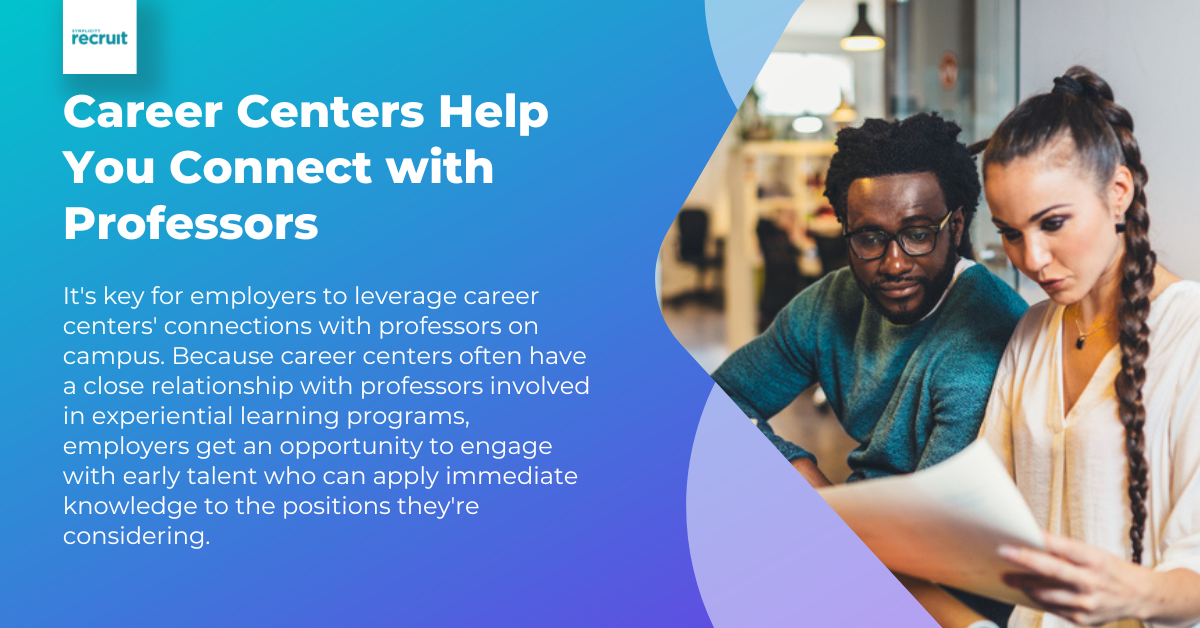It’s never a bad idea for recruiters to venture out of their comfort zones and find new ways to engage with early talent. With the tail end of the recruiting season just around the corner, recruiters are pouring over resumes, searching databases, and sourcing candidates as quickly as possible to fill available spots for summer internships and entry-level openings. While tools are available to optimize the recruiting process, one of the best solutions is often the least used: collaborating with career centers.
Here are three ways to leverage career centers during your recruiting season.
Get an Inside Scoop Through Career Center Survey Data
One of the best ways to connect with early talent at the school you’re recruiting is to get to know the student body through data. Many higher education institutions conduct annual, or semi-annual, surveys where students get to share insights on where they stand with post-graduation career plans. Recruiters can get an inside scoop on which companies are popular among early talent to see how they compete with other employers recruiting at the same schools.
Career services offices typically conduct surveys, and employers in active relationships with the schools’ career centers have access to student body information specific to the schools they’re recruiting from. This allows employers to build more impactful and efficient recruiting strategies during recruiting season by being able to identify eligible candidates to actively recruit from and narrow down search parameters
Career Centers Help Create a Buzz
Because career centers have a direct line of communication with students interested in job opportunities, they can help employers spread the word about upcoming job openings, career fairs, and info sessions. For recruiters, this type of marketing is essential for a successful recruiting season.
Career centers help promote job opportunities by advertising open positions through internal job boards available to students. What’s more, with career centers, it’s easier for employers to select better-fit talent because they help advertise positions to targeted student groups throughout the school.
Let’s not forget that career centers typically help students put together their resumes. They can share a select amount of resumes with employers that specifically cater to their needs in entry-level positions. Moreover, as career centers maintain open communication with faculty, they can help in building career-ready skills in students before they apply to the desired job openings. Because of this, employers benefit from career centers’ communication channels to engage directly with early talent.

Career Centers Help Prepare Students for Long-Term Careers
A 2018 Strada-Gallup Education Consumer Survey found that 58% of students attending higher ed institutions are motivated to get a degree by job and career outcomes. Because career centers are becoming more and more deeply involved in a student’s career planning, they can prepare students for long-term careers and not “right now” positions. They do this by helping students apply academic knowledge in real-world situations, enhancing their employability skills, like critical thinking skills and problem-solving, and helping them hone in on job-specific skills they’ll need to succeed in certain positions.
As employee retention continues to be the top priority for 20% of HR professionals, more than connecting with early talent, recruiters want to find best fit talent that’s ready to stay for the long haul. Career centers facilitate meaningful relationships between recruiters and employers by contributing to career education and not just another recruiting season to fill in entry-level positions.
About Recruit
Symplicity Recruit is the premier early talent recruiting platform used by over 600,000 employers. Key features include centralized management of job postings across a network of over 600 academic institutions, a filterable resume database, and the ability to directly message students. Contact us to learn more.